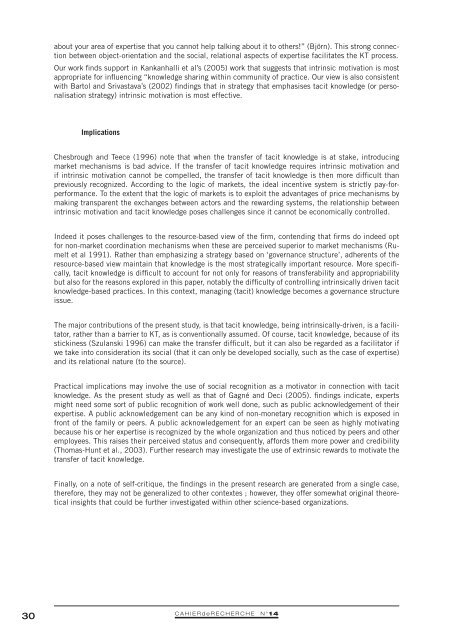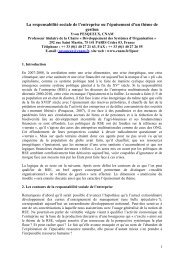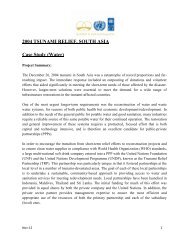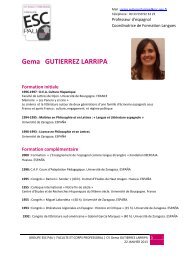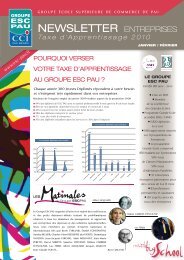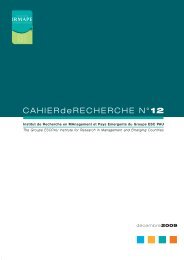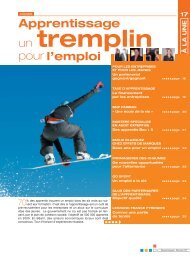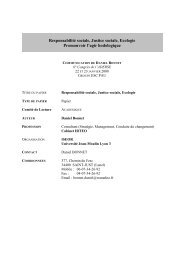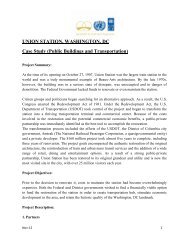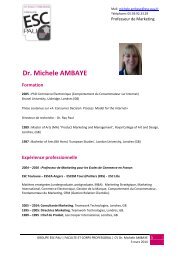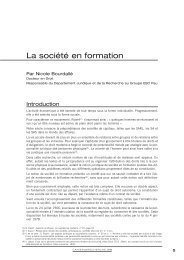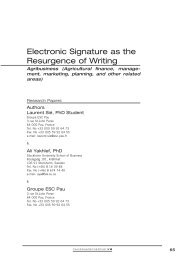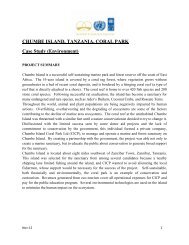on after I am gone. It is of no use to me anymore, and for this reason I ‘give’ it [back] to my company.My expertise doesn’t belong to me, I have been lucky to have had the opportunity to acquire it at thiscompany, and it would be painful to see it disappear after I retire”. Adds Adam: «I consi<strong>de</strong>r transferringknowledge fundamental to the sustenance and survival of our profession; and if we fail to do so, we wouldnot measure up to our profession». By transferring their knowledge, experts believe that they expand thefield of their expertise to other individuals. Ka<strong>de</strong>r says: «the fact that I am not going to stay here for long,I want to see my expertise transferred back to my company, I do not want it to go to waste. I want to passit on to other generations. The worst scenario I can imagine is to see it wither away after I leave this company».Nicholas elaborates: “when a <strong>de</strong>parting expert transfers his knowledge, he takes part, on a smallor big scale, in the process of enriching his field of expertise». Fre<strong>de</strong>rich sees this feeling of contributingto this stock of collective knowledge as «one’s duty” and a strong motivator for transferring it.4 - Discussions, implications and conclusionThe <strong>de</strong>scriptive evi<strong>de</strong>nce presented in the previous section tends to suggest that there is a strong relationshipbetween tacit knowledge (which is intrinsically-driven) and its transfer. Intrinsically–drivenexperts work mainly in various projects, where sharing knowledge is the basis of teamwork. For instance,when an operational geoscientist has a measurement problem that s/he discusses with an expert, thisproblem is one further case for the expert to think about, and an opportunity to enrich their experience.Transferring and sharing expert knowledge is part of the whole team’s daily job. In their study of expertiseKT, Osterloh and Frey (2002) found that there is a relationship among the form of motives, organizationalforms, and the form of knowledge (whether tacit of explicit) to be transferred. In a nutshell, experts workingin<strong>de</strong>pen<strong>de</strong>ntly would tend to value their hard-won expertise individually, therefore valuing extrinsicmotivation. Contrarily, experts working in teams would tend to view their expertise as collective, wherenone can claim to possess it individually. Although we agree with this finding, we also believe that theinstrinsic interest y experts in and passion for their expertise plays a crucial role in its transfer. This intimaterelationship drives them to care for it, to expand it and to reproduce it by sharing it with others.As noted above, the dominant logic un<strong>de</strong>rlying intrinsic motivation cannot be mainly un<strong>de</strong>rstood in termsof exchange value, of ‘prices’, but rather in terms of ‘prizes’. Experts’ attachment to their expertise is notonly a means to an end, but largely an end in itself - performing an activity for the pleasure of performingit. In addition, social and peer recognition is clearly significant, as this affords them more power andcredibility (Thomas-Hunt et al., 2003). This social recognition is consi<strong>de</strong>red highly motivating by mostof the experts. Experts expect recognition for their status as experts, regarding sharing their expertise asintegral in their very work.From this perspective, the distinction between KT and knowledge creation is hard to maintain in thecontext of expert knowledge. Despite the specific empirical context, our insights find support in otherstudies. Jankowicz (1999: 319), for example, <strong>de</strong>scribes the KT process as a “mutual knowledge creation”process, as it captures the negotiation of new un<strong>de</strong>rstandings that emerge in interactions. Likewise,Bedward et al (2003: 53) question the appropriateness of the very expression “transfer”, suggestinginstead the concept of “translation” to capture the “collaborative effort of mutual knowledge creation”,where each party is trying to influence the other. More specifically, in the case of expertise, because of itsrelational nature, its acquisition requires interactions with others. Interactions are occasions for expertsto confront new problems and new challenges, which enable them to augment their stock of expertise.Furthermore, expertise presupposes a strong attachment to an object. This means that experts are firstand foremost so passionate about their object of interest (object-orientation) that they are readily disposedto share it and leverage it in interactions with others (relational): “you are so excited and passionateCAHIER<strong>de</strong>RECHERCHE N°1429
about your area of expertise that you cannot help talking about it to others!” (Björn). This strong connectionbetween object-orientation and the social, relational aspects of expertise facilitates the KT process.Our work finds support in Kankanhalli et al’s (2005) work that suggests that intrinsic motivation is mostappropriate for influencing ‘‘knowledge sharing within community of practice. Our view is also consistentwith Bartol and Srivastava’s (2002) findings that in strategy that emphasises tacit knowledge (or personalisationstrategy) intrinsic motivation is most effective.ImplicationsChesbrough and Teece (1996) note that when the transfer of tacit knowledge is at stake, introducingmarket mechanisms is bad advice. If the transfer of tacit knowledge requires intrinsic motivation andif intrinsic motivation cannot be compelled, the transfer of tacit knowledge is then more difficult thanpreviously recognized. According to the logic of markets, the i<strong>de</strong>al incentive system is strictly pay-forperformance.To the extent that the logic of markets is to exploit the advantages of price mechanisms bymaking transparent the exchanges between actors and the rewarding systems, the relationship betweenintrinsic motivation and tacit knowledge poses challenges since it cannot be economically controlled.In<strong>de</strong>ed it poses challenges to the resource-based view of the firm, contending that firms do in<strong>de</strong>ed optfor non-market coordination mechanisms when these are perceived superior to market mechanisms (Rumeltet al 1991). Rather than emphasizing a strategy based on ‘governance structure’, adherents of theresource-based view maintain that knowledge is the most strategically important resource. More specifically,tacit knowledge is difficult to account for not only for reasons of transferability and appropriabilitybut also for the reasons explored in this paper, notably the difficulty of controlling intrinsically driven tacitknowledge-based practices. In this context, managing (tacit) knowledge becomes a governance structureissue.The major contributions of the present study, is that tacit knowledge, being intrinsically-driven, is a facilitator,rather than a barrier to KT, as is conventionally assumed. Of course, tacit knowledge, because of itsstickiness (Szulanski 1996) can make the transfer difficult, but it can also be regar<strong>de</strong>d as a facilitator ifwe take into consi<strong>de</strong>ration its social (that it can only be <strong>de</strong>veloped socially, such as the case of expertise)and its relational nature (to the source).Practical implications may involve the use of social recognition as a motivator in connection with tacitknowledge. As the present study as well as that of Gagné and Deci (2005). findings indicate, expertsmight need some sort of public recognition of work well done, such as public acknowledgement of theirexpertise. A public acknowledgement can be any kind of non-monetary recognition which is exposed infront of the family or peers. A public acknowledgement for an expert can be seen as highly motivatingbecause his or her expertise is recognized by the whole organization and thus noticed by peers and otheremployees. This raises their perceived status and consequently, affords them more power and credibility(Thomas-Hunt et al., 2003). Further research may investigate the use of extrinsic rewards to motivate thetransfer of tacit knowledge.Finally, on a note of self-critique, the findings in the present research are generated from a single case,therefore, they may not be generalized to other contextes ; however, they offer somewhat original theoreticalinsights that could be further investigated within other science-based organizations.30CAHIER<strong>de</strong>RECHERCHE N°14
- Page 1 and 2: CAHIERdeRECHERCHE N°14Institut de
- Page 4: SommaireComment classer les actionn
- Page 7 and 8: RésuméA l’origine, la théorie
- Page 9 and 10: influence via un contrôle externe
- Page 12 and 13: La très grande richesse des travau
- Page 14 and 15: a prévalu pendant de nombreuses an
- Page 16 and 17: Lorsque l’actionnariat a majorita
- Page 18 and 19: ConclusionAinsi, il existe différe
- Page 20 and 21: Huynh, Q. T. (2009), L’influence
- Page 22 and 23: Intrinsic Motivation,Tacit Knowledg
- Page 24 and 25: IntroductionAlthough the importance
- Page 26 and 27: to direct the ability to balance th
- Page 28 and 29: The empirical material is elicited
- Page 32 and 33: ReferencesAnderson JR (1982), “Ac
- Page 34 and 35: CAHIERdeRECHERCHE N°1433
- Page 36 and 37: University Corporate Governancein t
- Page 38 and 39: of expertise, workload, unpaid time
- Page 40 and 41: 3. Scenario PlanningUncertainty is
- Page 42 and 43: 6. Risk GovernanceRisk governance i
- Page 44 and 45: ReferencesBaird, J. (2007) ‘Takin
- Page 46 and 47: CAHIERdeRECHERCHE N°1445
- Page 48 and 49: Une analyse de la gestionde la perf
- Page 50 and 51: I. Les outils de gestion de la perf
- Page 52 and 53: définissant les finalités des act
- Page 54 and 55: Pour trois-quarts des collectivité
- Page 56 and 57: Au-delà de leur relative nouveaut
- Page 58 and 59: 2. Une mise en œuvre opérationnel
- Page 60 and 61: Or, une démarche de performance se
- Page 62 and 63: 3. L’adaptation du système local
- Page 64 and 65: esponsabilisation et d’évaluatio
- Page 66 and 67: I. NONAKA, “A dynamic theory of o
- Page 68: PROGRAMME GRANDE ÉCOLE, GRADE MAST


